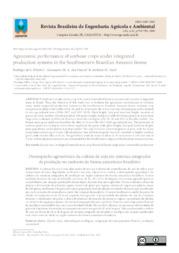Agronomic performance of soybean crops under integrated production systems in the Southwestern Brazilian Amazon biome.
Agronomic performance of soybean crops under integrated production systems in the Southwestern Brazilian Amazon biome.
Author(s): RIBEIRO, R. da S.; PASSOS, A. M. A. dos; AKER, A. M.
Summary: Soybean is an alternative crop to be used in intensified land use systems and recovery of degraded areas in Brazil. Thus, the objective of this study was to evaluate the agronomic performance of soybean crops under integrated production systems in the Southwestern Brazilian Amazon biome. Soybean crop was grown in alleys with widths of 18, 30, and 42 m between the 4-row tree sets of eucalyptus and evaluated in two agricultural years (2016-2017 and 2017-2018). Plant height, first pod insertion height, number of grains per pod, number of pods per plant, 100-grain weight, and grain yield of soybean plants at maturation stage were evaluated in different distances from the eucalyptus (10, 20, 30 and 45% of the alley width). The lowest mean grain yield was found for the alley of 18 m in the 2017-2018 agricultural year. The proximity of soybean plants to eucalyptus trees affects negatively the grain yield, plant height, first pod insertion height, plant population, and number of pods per plant. The crop-livestock-forest integration system, with the forest component consisting of 5-year-old eucalyptus trees (technical age for harvest), resulted in higher soybean grain yields for the alley of 42 m. The growth of soybean crops in alleys of 18 m between 4-row tree sets of 5-year-old eucalyptus trees is not recommended for the Southwestern region of the Brazilian Amazon biome.
Publication year: 2020
Types of publication: Journal article
Unit: Embrapa Maize & Sorghum
Observation
Some of Embrapa's publications are published as ePub files. To read them, use or download one of the following free software options to your computer or mobile device. Android: Google Play Books; IOS: iBooks; Windows and Linux: Calibre.
Access other publications
Access the Agricultural Research Database (BDPA) to consult Embrapa's full library collection and records.
Visit Embrapa Bookstore to purchase books and other publications sold by Embrapa.

